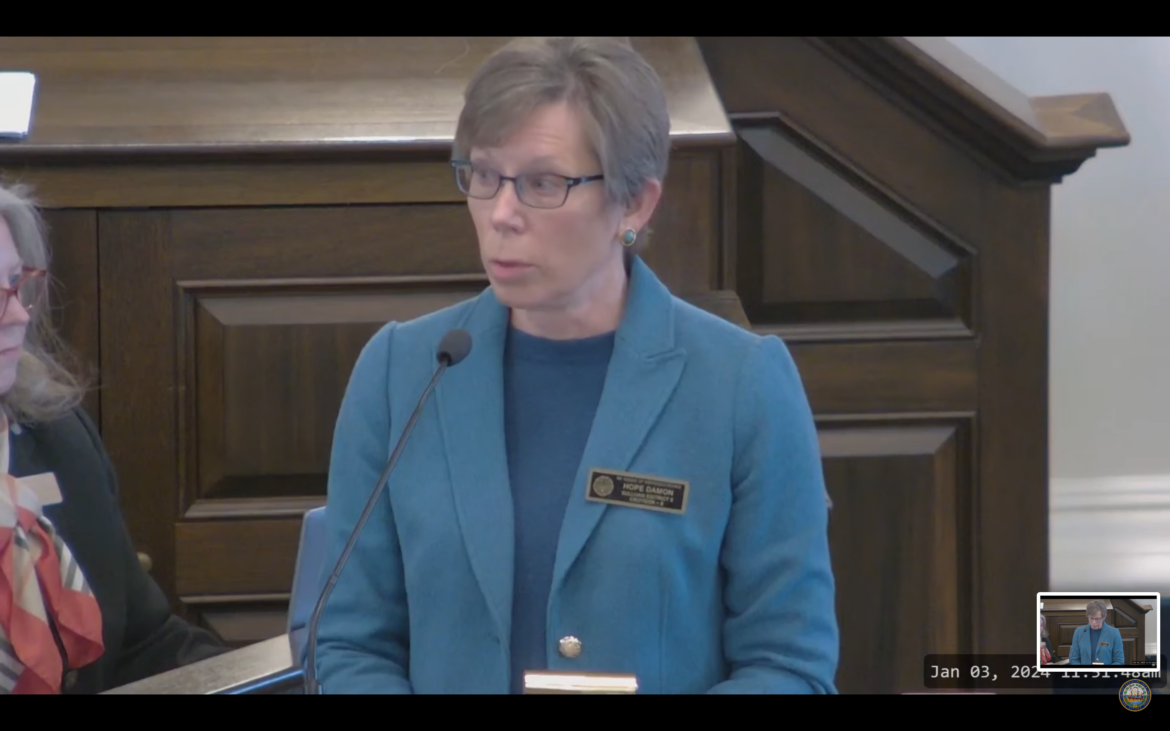By GARRY RAYNO, InDepthNH.org
CONCORD — The House Wednesday decided charter schools should be able to participate in the state building aid program, but failed to approve greater safety measures for students on the first day of the 2024 legislative session.
The House over two days is scheduled to act on over 200 bills that were retained last session instead of taking a final vote, including some of the more controversial bills dealing with transgender health care, a new state primary date and landfill siting.
The House had a number of Education Committee bills that split the committee down partisan lines, although many of the bills were tabled to either die or be taken up at a later date.
House Bill 354 would allow charter schools to participate in the state building aid program, which currently has a $200 million backlog for projects after a moratorium on state help for nearly a decade.
The bill was approved on a 190 to 177 vote.
Rep. David Luneau, D-Hopkinton, argued the bill should wait until the Department of Education completes its work to require more economic stability for charter schools before moving forward.
He said if the state provides construction grants and the charter school fails, as many have, the state’s taxpayers will be on the hook and will not be paid back as is required under the traditional state building aid program.
“This is not a vote against charter schools and not a vote against opportunities for kids,” Luneau said. “It is a vote against a bad policy that needs more work.”
But Valerie McDonnell, R-Salem, argued charter schools like traditional public schools should have the same opportunities to access state building aid.
Charter schools would complete the same application and demonstrate the same need as traditional public schools, she said, but instead of receiving the money up front as school districts do, the money would be paid out gradually to the charter schools.
“Charter school enrollment has increased 35 percent since the pandemic,” McDonnell noted, and “seven have waitlists and three new schools will open this year. We need to ensure these students have a place to learn.”
The House was not supportive of requiring non-public schools or education service providers that accept public money, to require criminal background checks of employees and volunteers, as public schools are required to do.
House Bill 628 has a list of crimes that would result in immediate removal from the educational setting and would have a process that would be able to identify a person who tries to change their identity to avoid detection, said the bill’s prime sponsor, Rep. Linda Tanner, D-Georges Mills.
But Rep. Margaret Drye, R-Plainfield, said most non-public and certified educational services do background checks on employees and volunteers, and some go beyond what is required of public schools, due to accreditation, policy or insurance.
“In today’s climate,” she said, “they would be foolish not to.”
She maintained the only area affected by the bill would be home schoolers who accept state money under the Education Freedom Account program.
That would mean the piano teacher or another mom who is part of a cooperative would be required to have background checks at their own expense, Drye said, noting it would be having a private citizen request a criminal background check on another private citizen.
“There are too many unanswered questions on home school parents,” she said.
But Rep. Glenn Cordelli, R-Tuftonboro, said the bill would require “parents to have background checks to educate their own children. This substitutes government for parents.”
But Tanner said all children should be able to be safe whether in a public school or a private school that accepts state funds.
They should not be voting against background checks because they are inconvenient or too intrusive, Tanner said. “We should ensure all children in all settings — as best we can — are protected from any horrifying experience that will be with them for the rest of their lives.”
She said the bill was never intended to include traditional homeschooling programs that do not use state money.
Rep. Hope Damon, D-Sunapee, said the safety of children should not be determined by where they are educated, noting most abuse involves a trusted adult.
The bill was killed on a 199-174 vote.
Damon also urged her colleagues to approve Senate Bill 151, which would require students learn about mental health as part of a school’s curriculum, noting that suicide is the second leading cause of death among teenagers.
The bill was requested by the Governor’s Youth Advisory Council and passed the Senate on a voice vote.
Damon said her committee heard poignant testimony from teens who did not receive mental health education and how having a basic understanding could allow them to help their friends.
“This bill does not in any way provide diagnosis or treatment of mental health conditions in schools,” Damon said. “It simply includes education on these disorders in the same way we inform students of cardiovascular disease risk factors and other physical health concerns.”
She said the bill would help decrease the stigma around mental health.
But Education Committee chair Rep. Rick Ladd, R-Haverhill, said the bill is not needed as mental health is included under health requirements and guidelines and approved by the State Board of Education.
He said the bill places the need for mental health education under the section on what constitutes an adequate education, where it could be problematic.
Ladd said mental illness is a serious problem both in schools and in society and noted there is already a multi-system of support for mental health behavioral issues in place for schools.
The bill was killed on a 186-183 vote.
Garry Rayno may be reached at garry.rayno@yahoo.com.





